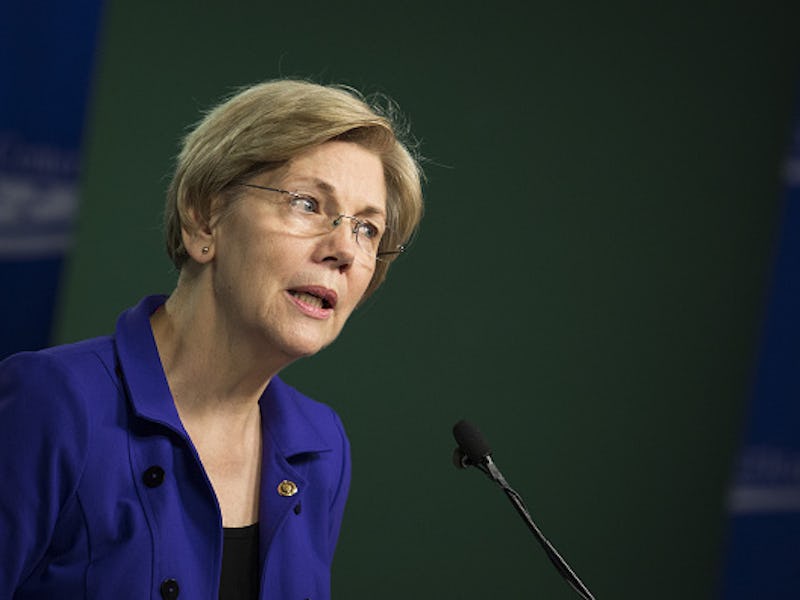Elizabeth Warren Is Taking on the Gig Economy – and It Might Benefit Uber, Lyft
On Thursday, democratic Senator Elizabeth Warren laid out her plan to adapt employment law to the gig economy.

Workers in the gig economy often fall through the cracks of employment law, neither truly qualifying as traditional employees nor total free agents. The legal murkiness has resulted in a bevy of lawsuits and legal skirmishes — the most recent being the $100-million settlement Uber reached with its drivers in a dispute over whether they should be classified as employees or independent contractors.
In a speech on Thursday, Massachusetts Senator Elizabeth Warren outlined her plan to update the basic labor protections forged in the Industrial Revolution — minimum wage, paid time off, bargaining rights — so that this growing class of workers is not left out. If Warren got her way, every type of worker would have a similar basic level of benefits and protections, no matter what kind of labor arrangement they may have.
“The problems facing gig workers are much like the problems facing millions of other workers,” she said at the New America annual conference in Washington, D.C. An outdated employee benefits model makes it all but impossible for temporary workers, contract workers, part-time workers, and workers in industries like retail or construction who switch jobs frequently to build any economic security. Just as this country did a hundred years ago, it’s time to rethink the basic bargain between workers and companies.”
Here’s how she suggests doing it: The gig economy might be better classified as the “1099 economy” (as David Dayen dubbed it in The New Republic), since the workers who drive for Uber, fix pipes for Handy, or stand in line for TaskRabbit all have in common a 1099-MISC employment tax form. They aren’t employees: They’re independent contractors, without any of the protections usually associated with employment relationships. Independent contractors aren’t guaranteed minimum wage, paid time off, overtime compensation, or collective bargaining rights.
Warren proposes that all workers should be guaranteed a basic level of protection: catastrophic insurance to kick in after a severe accident or illness, paid leave, and the right to organize. Plus, she says benefits for health care and retirement should become fully portable, creating a safety net that exists regardless of employment status. Similar to how the Affordable Care Act helped decouple health care from employment, Warrens proposal would decouple retirement plans from work. That would mean even Uber drivers could access high-quality retirement savings accounts that are usually reserved for traditional employees.
Warren is fuzzy on whether companies should underwrite their workers’ portable benefits structures, or whether it’s something workers should organize on their own through unions. De-coupling benefits packages from employment could end up being a blessing for employers, which could outsource the responsibility of managing their workers’ benefits.
Several hundred Uber drivers and their supporters strike in front of Uber's Queens offices in New York.
At the same time, the Massachusetts senator (and much-discussed potential VP pick) said that the federal government should crack down on companies that save money by falsely classifying their workers as independent contractors. “Employers shouldn’t be misclassifying workers to keep labor costs down and they shouldn’t be hiding behind complex arrangements like franchising and subcontracting to skirt their responsibilities to their workers,” she said. Warren wasn’t just talking about the way tech companies classify their gig workers: The 1099 economy includes home care workers for the elderly, cable installers, and even journalists. The ranks of independent contractors grew by almost 10 million workers between 2005 and 2015.
The idea of portable benefits has been fomenting for a while behind the scenes — and it’s one where many labor activists and tech companies seem to have found common ground. In November, a coalition of labor and tech leaders, including the CEOs and co-founders of Lyft, Etsy, Handy, and Instacart, penned a letter with the same driving principal as Warren’s recent speech. “We, the undersigned, believe that society and the economy are served best when workers have both stability and flexibility. Everyone, regardless of employment classification, should have access to the option of an affordable safety net that supports them when they’re injured, sick, in need of professional growth, or when its time to retire,” the letter said. The letter punted on particulars, instead encouraging policymakers to “continue this conversation.”
Of course, it’s not an entirely selfless gambit for the tech companies. By creating a structure of portable benefits for independent contractors, gig-economy companies might gain flexibility in classifying them. Uber’s recent settlement with drivers in Massachusetts and California set it back $100 million — and still failed to answer the question of how to classify its workers, since the lawsuit was settled before a federal court could decide. In January, Lyft settled a similar suit for $12.25 million. One on-demand company, Homejoy, folded in the midst of a lawsuit over employment misclassification because the litigation was so damaging.
Warren’s speech Thursday left plenty of questions: Who will pay for these portable benefits? How will they be structured? Should on-demand workers be considered employees? But the senator has been the leading voice on a number of progressive issues in the past, driving policy ideas focusing on income inequality and banking reform into the heart of the Democratic party platform. This might just be her opening salvo.